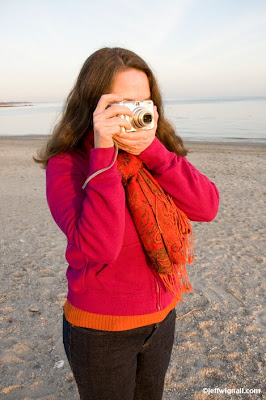- DO read your camera’s manual. It’s one of the few books that was written expressly for the camera that you own. Also, see if there is a Magic Lantern Guide published for your camera—they’re much better written and well illustrated. Keep your camera with you as you read and find each control or feature as you read about it.
- DO read all of the menu screens. Granted some menus are kind of obtuse, but the menus are the dashboard of your camera and the more familiar you are with the menu choices—and sub-choices—the faster you can custom set your camera to a particular situation.
- DO take your manual with you when you’re out shooting. If you’re out on a Sunday afternoon cruising for snaps and you encounter a question about camera controls, you don’t want to wait until you get home to find the answers. Keep the manual in a plastic zipper bag.
- DO take lots of pictures. Photography, like any craft, is a learn-by-doing process and since you’re shooting digitally, hey, no film to buy. The more photos that you take the more comfortable you’ll feel with new camera and the more likely you are to experiment.
- DON’T, however, just shoot carelessly because it’s free. Take the time to think about each photograph that you take; think quality, not quantity.
- DO feel free to leave the camera in the Program or Auto exposure mode while you’re getting used to it. Better to shoot pictures right away than to avoid the camera because you’re intimidated by its complexities. Lots of pros, including me, use the program mode regularly (you need only look at the EXIF data in this book to see that).
- DON’T be afraid to experiment with all of the controls. Try out different exposure modes and see what happens. Search for and play with unusual modes like flash exposure compensation. Again, just read the manual and have fun. Short of dropping it on concrete, you can’t hurt the camera. There’s a reset button (see your manual) to take you back to all of the default settings if you get hopelessly tangled.
- DO print your pictures frequently so that you can see your mistakes and successes more clearly. There’s nothing like seeing a nice 8 x 10 of a great shot to boost your confidence (or to show you your technique flaws).
- DO look for a basic (or advanced if you’re past the beginner’s stage) digital photo course at your local adult continuing education program. I’ve taught continuing-ed programs and I’ve taken classes, they’re a great way to learn and I’ve made a lot of good friends there.
- DON’T live in a creative vacuum. Join a photo-sharing community like Flickr or Digital Image Café and see what others are doing creatively and get advice from others who own the same camera.
Anthropic and the Future of Copyright
2 months ago







1 comment:
Great tips! I am doing just that. I've signed up for a class and I'm now looking to upgrade my camera.
Post a Comment